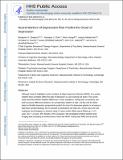Neural markers of depression risk predict the onset of depression
Author(s)
Whitfield-Gabriel, Susan; Gabrieli, John D. E.
DownloadAccepted version (511.0Kb)
Publisher with Creative Commons License
Publisher with Creative Commons License
Creative Commons Attribution
Terms of use
Metadata
Show full item recordAbstract
Although research highlights neural correlates of Major Depressive Disorder (MDD), it is unclear whether these correlates reflect the state of depression or a pre-existing risk factor. The current study examined whether baseline differences in brain activations, resting-state connectivity, and brain structural differences between non-symptomatic children at high- and low-risk for MDD based on familial depression prospectively predict the onset of a depressive episode or increases in depressive symptomatology. We re-assessed 44 participants (28 high-risk; 16 low-risk) who had undergone neuroimaging in a previous study 3–4 years earlier (Mean age at follow-up = 14.3 years, SD = 1.9 years; 45% females; 70% Caucasian). We investigated whether baseline brain imaging data (including an emotional face match task fMRI, resting-state fMRI and structural MRI) that differentiated the risk groups also predicted the onset of depression. Resting-state functional connectivity abnormalities in the default mode and cognitive control network that differentiated high-risk from low-risk youth at baseline predicted the onset of MDD during adolescence, after taking risk status into account. Increased functional activation to both happy and fearful faces was associated with greater decreases in self-reported depression symptoms at follow-up. This preliminary evidence could be used to identify youth at-risk for depression and inform early intervention strategies. ©2019
Date issued
2019-03Department
Massachusetts Institute of Technology. Department of Brain and Cognitive SciencesJournal
Psychiatry research. Neuroimaging
Publisher
Elsevier BV
Citation
Shapero, Benjamin G., et al., "Neural markers of depression risk predict the onset of depression." Psychiatry research. Neuroimaging 285 (2019): p. 31-39 doi 10.1016/J.PSCYCHRESNS.2019.01.006 ©2019 Author(s)
Version: Author's final manuscript
ISSN
1872-7506
0925-4927